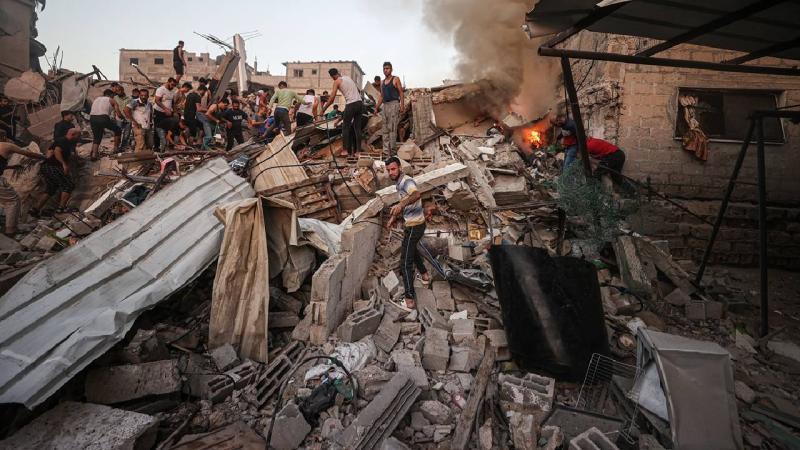Because of Europe’s weight of genocide during WWII, a country like Israel has seized global politics, despite the fact that neither its population nor its geographical location should be sufficient to dictate world politics.
Neither the United States nor Europe can halt the Netanyahu regime. The West is facing two captivities at once. On the one hand, the unwavering support for Israel that followed the October 7 Hamas strikes makes it tough to retreat.
From the US sending aircraft carriers to the region shortly after the assaults, to Biden becoming the first US President to visit Israel while the war was still raging, to European Commission President Ursula of der Layen’s visit to support Israel, the West just stood by Israel.
On the other hand, there is the dilemma of not falling into the shame of abandoning the Jewish community, which ‘looks like itself’ and which was the victim of the Holocaust in Europe. Especially in Germany, this mental and psychological bondage has reached the point of appointing academics from universities who criticize Israel.
This ideologically and theologically based stance on the side of Israel, whose geopolitical or strategic value does not deserve this support, has led to a division on the axis of ‘civilization’. We are at a point where world trade routes have changed and normalization processes that started earlier and ignored the realities of the region have stalled.
But how sustainable this situation is is being questioned from the US to Israel.
One of the two main reasons for this is that the number of Palestinians killed in Israel’s 127-day offensive, excluding short breaks for prisoner swaps, has exceeded 28,000. The second is that the inhumanity of the Palestinians, the impossibility of Netanyahu’s goal of completely destroying Hamas, and the fact that Israeli terrorism invites endless war are forcing those who support it.
Many world leaders, from Hillary Clinton, who has been the clearest supporter of Israel, to US President Biden, do not hesitate to insult Netanyahu in closed meetings.
The US Congress rejected a $17.6 billion aid package for Israel, despite the majority of congressmen supporting it. The fact that Rashida Tlaib, a Palestinian member of Congress, said that even some of those who voted in favor of the bill came to her and said, “We hate Netahyahu too,” is a confession of how they are trapped in a compulsion.
What a mistake to believe that Netanyahu alone is responsible for the security risks posed by Israel and the massacres of Palestinian people and that it is easy to turn a new page.
Aluf Benn, editor-in-chief of the Israeli daily Haaretz, wrote an article in Foreign Affairs, one of America’s leading foreign policy journals, titled “Israel’s self-destruction” (after the English right to self-defense), in which he describes how Netanyahu is personally leading Israel to disaster and how this policy is fed by domestic dynamics. With or without Netanyahu, Benn argues, the Israeli state policy of occupation, settlers and Palestinian displacement will continue.
Netanyahu is just the embodiment of the security trauma, the perception of superiority, the belief that they are the agents of historical revenge and the presupposition that they will receive unconditional support.
And much of the Israeli objection to the Gaza attacks today is not so much about questioning the guilt of the killings as it is about the view that the current policy is not enough to make Israel safer.
If the West can develop an approach that breaks out of this vicious circle, all the suffering in the region could pave the way for a more stable peace or a sustainable ceasefire.
Again, if the current crisis paves the way for the establishment of a regional security structure that exists in many parts of the world but not in the Middle East, this would be a positive step for the region. Unfortunately, regional cooperation processes, which have recently become more positive, are not at a point where this can be realized. Iran’s approach, which bases its security on the instability of the predominantly Muslim countries around it, shows how difficult this is.
If there is no structural transformation in the West or in the countries of the region, the deaths since October 7 will only be a harbinger of future crises of at least this scale.





